If you’ve ever tried to fix a greenhouse, you’ll know exactly how important a perfect 45-degree angle is. If the glass is supported by a frame anywhere even slightly out from 90 degrees it’s going to blow out when the frame rocks.
Mitre saws never seem like a necessary tool until it’s too late, so in this guide, we’re going to work through not just how to choose the best mitre saw, but what the mitre saw terminology means for beginners, and dig into a bit more details for the pros out there looking for expert advice before they buy their new mitre saw.
More...
Top Pick

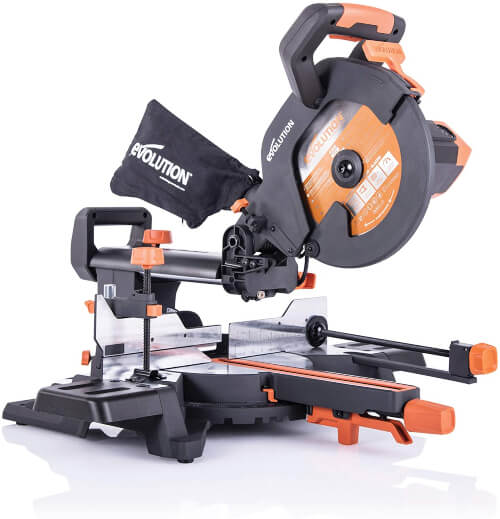
Premium Choice

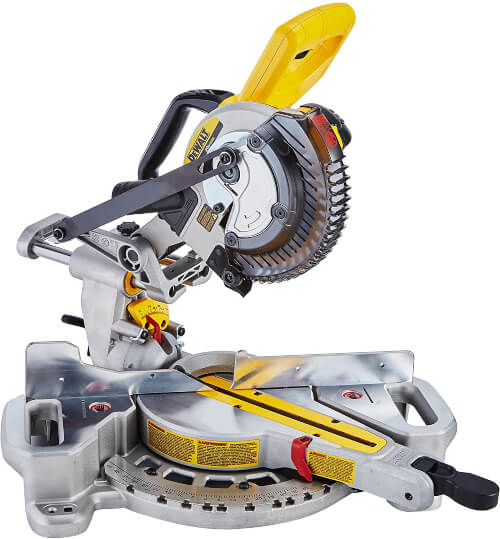
Best Mitre Saws for 2025
Product | Our Rating | Price | |
|---|---|---|---|
1. Evolution Power Tools Compound Mitre Saw | 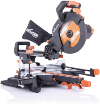 |  | |
2. DEWALT DCS361M1 20V Max Cordless Mitre Saw | 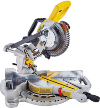 |  | |
3. Ryobi One Plus Cordless Mitre Saw | 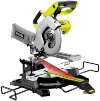 | ||
4. Draper 550 mm Manual Mitre Saw |  |
Tool Buyer’s Guide to Mitre Saws
What are Mitre Saws?
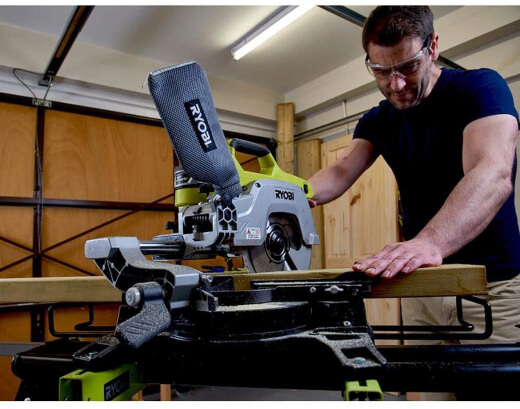
If you had to choose just one power saw for the garage, it should be a mitre saw. Mitre saws are adaptable and versatile tools and the only downfall in their design is the limitation on cutting widths.
Mitre saws are designed to cut perfect angles, either over or under 90 degrees from the length of a piece of timber. They are usually capable of cutting up to 4x4 timbers without strain and some types can create creative and unique angles that just aren’t possible to cut accurately with other saws and guide tools.
Why You Need a Mitre Saw
Plunge saws, circular saws, and table saws are all great tools, but there is no saw more capable of accurate and creative cutting than a mitre saw. With modern advances in power tools, mitre saws have become portable as well as powerful tools, and any homeowner, and any contractor should own one.
Before I bought my first mitre saw I used to cut everything with a mitre guide for a hand saw or mark out mitres to cut with a circular saw, and it was reasonable, but never perfect.
Mitre saws are the best tool for serious woodwork, and the only tool that gives you perfect angles every time (especially sliding mitre saws).
Types of Mitre Saws
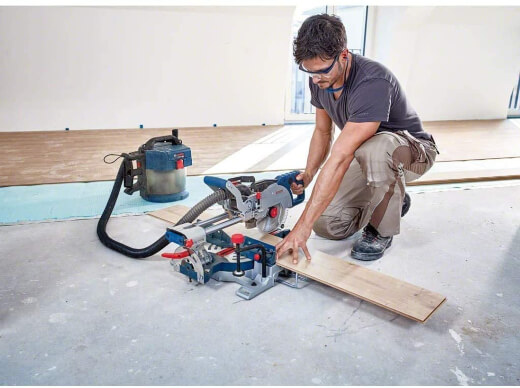
There are three main differences between electric mitre saws, and they’re to do with the capability, not power. It’s also important to note that almost all mitre saws have changeable blades, so you should never choose a mitre saw based on this blade, as you can easily change it for something that is capable of cutting timber metal, or plastic rather than buying a more expensive saw solely for its blade.
The three types of mitre saws are standard mitre saws, sliding mitre saws and compound mitre saws. But there is some confusion about whether or not bevel mitre saws should be defined in their own category.
In the sections below, we’ll explain the uses for each type of mitre saw, and how to create bevel edges.
Table or Portable Mitre Saws
Most mitre saws are capable of cutting neat angles and bevelled edges in 2x4 and 2x4, with high-end models designed to cope with thicker timbers like 4x4 fence posts.
There are variations in any type of mitre saw, but on average you should expect to pay upwards of $200 for a good quality basic mitre saw.
Sliding Mitre Saws
Sliding mitre saws are capable of wider cuts and are typically sold as corded, static saws and they take up more space than standard mitre saws. Typical sliding mitre saws cut up to 30cm across for cross-cuts, or mitre cuts of around 20cm.
Compound Mitre Saws
Compound mitre saws are able to cut bevelled edges, and mitres at the same time. They are usually more expensive than ordinary mitre saws but are definitely the best mitre saws you can buy.


Get Your Free Guide:
Master Growing Australian Natives eBook
A Must Have Complete Guide for Every Australian Garden
Get Your Free Guide:
Master Growing Australian Natives eBook
A Must Have Complete Guide for Every Australian Garden
If you want to splash out even further, you can buy sliding compound mitre saws, where the compound cuts can be created in timber up to 30cm wide for incredibly defined and accurate cuts. This can be useful for roofing around awkward angles or just to create unique garden structures.
Different Mitre Saw Cuts
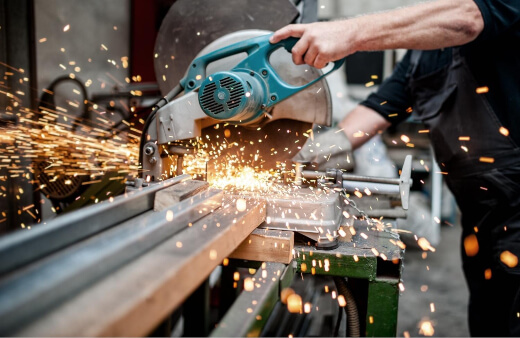
Cross Cut
A cross cut is a simple cut across the width of a piece of timber, generally 90 degrees to the length. To make cross cuts with your mitre saw, set the guides to 0 and securely clamp your timber in place.
Depending on the capability of the saw either plunge the saw down to cut the wood or plunge, then slide for wide timbers if you have a sliding mitre saw.
Mitre Cut
A mitre cut is a cut at any angle besides 90n degrees, but typically at 45 degrees to the length of timber. Mitre cuts are 90 degrees to the base, so allow us to create neat lines in even timbers like 2x2 or 2x4 while creating neat 90 degree joins.
Mitre saws are designed to make mitre cuts, so the timber is placed down with guides set to 0, and the saw is turned to 45 degrees. Then decide on the type of saw, either plunge through or slide to cut your timber.
Bevel Cut
Bevel cuts are detailed edges, where we cut at 45 degrees (or the desired angle) to the widest part of the timber. This technique is excellent for creating frames and crates, but not all mitre saws are capable of bevel cuts.
If you require bevel cuts you’ll need to look at higher-end mitre cutters with rotating blades.
Compound Cut
Compound cuts are a combination of bevel and mitre cuts and are often called combination cuts. These are cuts where the blade is tilted at 45 degrees to the floor and turned at 45 degrees to the timber.
This creates complex angles and is perfect for accurate carpentry when required, but not a necessity for most tasks. Avoid spending money on a compound mitre saw unless you know you definitely need one.
Mitre Saws Safety Tips
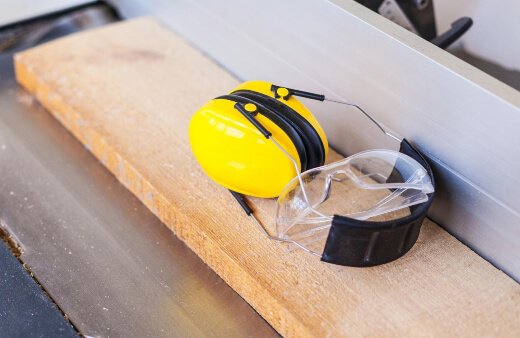
When you’re working with power tools, and particularly circular saws of any kind there are a few basic safety measures to take:
- Always use an extraction system and dust mask
- Wear hearing protection
- Wear eye goggles
- Keep fingers at least 15cm away from the saw blade
- Unplug the saw when it’s not in use
Mitre saws need some maintenance too, but the most basic rule is to always keep your work areas dust-free. Whenever you’ve finished cutting, disconnect the hoover attachment and clean down the table, blades, and surfaces to prevent dust from building up inside your tool.
Dust gets damp and can cause rust, and rusty blade lock, which can cause fires, or shatter the timber is cutting if the blade stalls mid-cut.
Mitre Saw Reviews
1. Evolution Power Tools Compound Mitre Saw

I’ve never come across Evolution Power Tools before, so they really are unknown, but with a 3-year warranty, they seem pretty confident in their tools.
This mitre saw is great though, with a really durable blade included in the package that can cut through metals, and even handles timber with nails still in without sparking.
If you’re on a budget and happy to try something new, this is a really wonderful saw with more durable safety features than most of the better-known brands.
Pros
Cons
2. DEWALT DCS361M1 20V Max Cordless Mitre Saw

Of all the plunge saws on review, the DeWalt is the only model without fault. It’s well made, has great safety features, and is incredibly easy to secure too.
The thing I was really impressed by, and I accept that this isn’t critical, was the batteries. In 99% of battery tools, the batteries are sold separately so to find a DeWalt mitre saw with batteries included is a minor miracle.
The carbide blade is incredibly durable too, and if you need a reliable mitre saw for on-site work, or for out in the garden even this is definitely the saw for you.
It’s slightly more expensive than other mitre saws with similar specs but it’s made from tougher stuff.
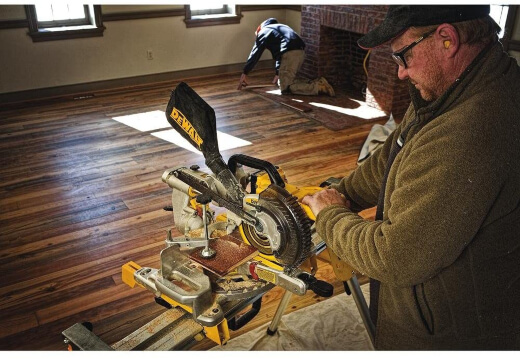
Source: amazon.com.au
Pros
Cons
3. Ryobi One Plus Cordless Mitre Saw
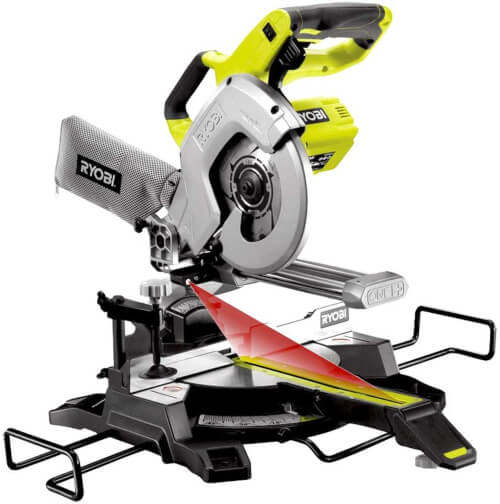
Ryobi’s portable mitre saw uses the same batteries as the rest of their range, which is always good if you’ve got other Ryobi tools around the house – otherwise you’ll need to invest in batteries separately.
The blade on this mitre saw is only 216mm wide, but it’s still capable of decent joinery, and for garden DIY it’s absolutely perfect, making light work of 2X2, and fencing to give you great accurate cuts.
The Ryobi mitre saw comes with a laser guide too, which helps give you confidence before every cut.
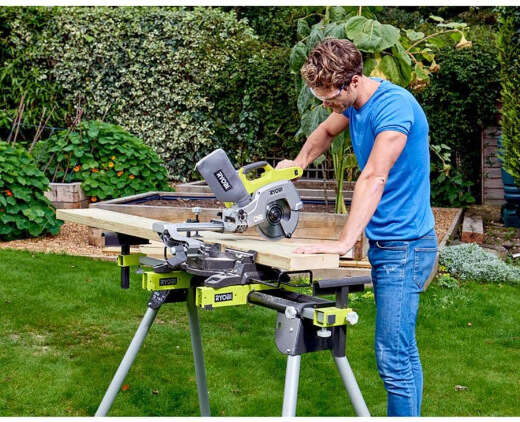
Pros
Cons
4. Draper 550 mm Manual Mitre Saw
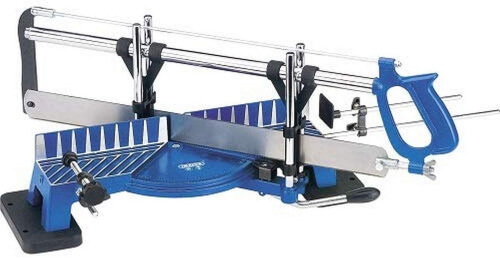
You might not have been expecting a manual mitre saw in this review, with it being 2025, but sometimes old tricks die hard. This saw from Draper has been in production for years, and I doubt it will ever go out of production.
It’s one of the best mitre saws ever sold, and it will continue to be one of the best mitre saws ever sold.
Ok, so you have to put the effort in to cut through anything, but if you want more control over your work, then manual cuts are the only way to go, and proper mitre guides like this are far more accurate than basic mitre blocks.
Pros
Cons
Best Mitre Saws Australia
Top Rated Mitre Saw


I’ve never come across Evolution power tools before, so it’s nice to see this incredibly well-built mitre saw, with safety, design, and convenience all considered by this brand as they break into the mainstream.
Evolution Power Tools Compound Mitre Saw's blades are capable of cutting through timber, metal, and plastics with minimal effort, and are fully corded, so even though they’re not easily potable, make much sturdier bench saws than most mitre saws.
Premium Choice Mitre Saw


DeWalt is definitely the obvious choice for our premium spot, and they’ve got a price to match, but if you’re looking for the best mitre saw in 2025, then the DEWALT DCS361M1 20V Max Cordless Mitre Saw is the one for you.
They’ve got everything covered from safety features, to ease of transport, with a fully collapsible, but still stable, mitre saw that’s great on-site, in the workshop and outdoors.
The battery-powered mitre saw is quick to charge too, with a battery life of up to 183 cuts through 2x4 pine.
Mitre Saw Frequently Asked Questions
What do you use a mitre saw for?
Mitre saws are used for cutting accurate angles in relatively narrow pieces of timber. While some sliding mitre saws are capable of cutting sheet materials, the general rule for mitre saws is that they’re designed for accurate angles in the framework.
Mitre saw stands makes using your mitre saw easier and a lot safer so be sure to check our reviews of the best mistre saw stands available for 2025.
Is it worth buying a mitre saw?
Mitre saws are the most important tool you’ll ever have in your garage, capable of effortless cross-cuts, but equally adept at accurate angled cuts, and they take all the effort out of calculating angle for you too.
There are plenty of power tools that aren’t worth the money, but mitre tools are 100% worth it.
Does a mitre saw need to be bolted down?
Mitre saws are safest when they are bolted or clamped down, but for working on-site that’s not always possible, so for safety, always ensure your mitre saw is on level ground and never put pressure on any part of the saw other than the handle when it is in use.
Can you cut 4x4 with a mitre saw?
Most mitre saws can cut 4x4 timbers but check the specifications of each model to be sure. When choosing the best mitre saws it’s always worth using 4x4 as a baseline because even though most cuts you’ll make are 2x2 or 2x4, you never know when you’ll need that extra capacity.
For more tool reviews, see our product review and buyer's guide list below:
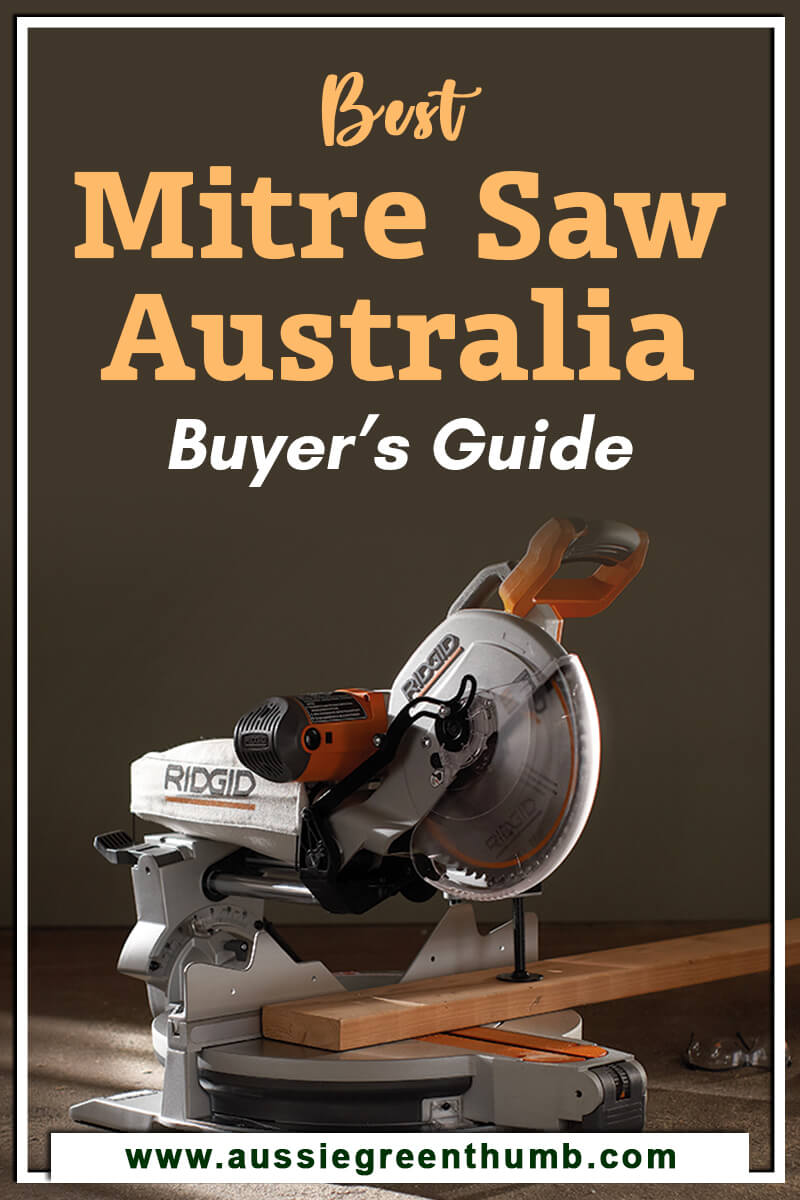
Get the Best Mitre Saw Today
Mitre saws are unique tools, capable of cutting angles that no other tool can. They’re steady and dependable, and whether you’re using a mitre saw in a workshop, the garden, or on-site, you should always be able to trust your mitre saw for safety.
When it comes to choosing the best mitre saw, make sure you know your task. Buy a mitre saw that can cut bevels if you need intricate cuts, or save money with a straightforward mitre cutter if you just need the basics.
Either way, there are some really incredible mitre saws on the market, or I hope you find one in our mitre saw reviews above.
Published on September 4, 2023 by Gary Clarke
Last Updated on December 27, 2024




